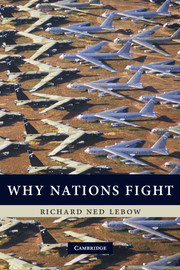Crossref Citations
This Book has been
cited by the following publications. This list is generated based on data provided by Crossref.
Lebow, Richard Ned
2010.
Motives, evidence, identity: engaging my critics.
International Theory,
Vol. 2,
Issue. 3,
p.
486.
Roger, Nathan
2011.
Noticeboard.
Journal of War & Culture Studies,
Vol. 3,
Issue. 3,
p.
349.
Stadelmaier, Frank
2012.
Die Welt nach 9/11.
p.
369.
Massie, Justin
2012.
Identités ethnoculturelles et politique étrangère : le cas de la politique française du Canada.
Canadian Journal of Political Science,
Vol. 45,
Issue. 1,
p.
119.
JACOBI, DANIEL
and
FREYBERG-INAN, ANNETTE
2012.
The Forum: Human Being(s) in International Relations.
International Studies Review,
Vol. 14,
Issue. 4,
p.
645.
Agné, Hans
Bartelson, Jens
Erman, Eva
Lindemann, Thomas
Herborth, Benjamin
Kessler, Oliver
Chwaszcza, Christine
Fabry, Mikulas
and
Krasner, Stephen D.
2013.
Symposium ‘The politics of international recognition’.
International Theory,
Vol. 5,
Issue. 1,
p.
94.
Bartelson, Jens
2013.
Three concepts of recognition.
International Theory,
Vol. 5,
Issue. 1,
p.
107.
Onea, Tudor A.
2013.
US Foreign Policy in the Post-Cold War Era.
p.
1.
Hehir, Aidan
2013.
Humanitarian Intervention.
p.
168.
Lindemann, Thomas
2013.
The case for an empirical and social-psychological study of recognition in international relations.
International Theory,
Vol. 5,
Issue. 1,
p.
150.
Fraser, Ken
2013.
What We're Fighting For: Motivation, Evolution, and the Data Sets of War.
International Studies Review,
Vol. 15,
Issue. 4,
p.
609.
Demetriou, Daniel
2013.
Honor War Theory: Romance or Reality?.
Philosophical Papers,
Vol. 42,
Issue. 3,
p.
285.
Sylvester, Christine
2014.
TerrorWars: Boston, Iraq.
Critical Studies on Terrorism,
Vol. 7,
Issue. 1,
p.
11.
Booth, Ken
2014.
The Handbook of Global Security Policy.
p.
9.
Reuveny, Rafael
and
Barbieri, Katherine
2014.
On the effect of natural resources on interstate war.
Progress in Physical Geography: Earth and Environment,
Vol. 38,
Issue. 6,
p.
786.
Strömbom, Lisa
2014.
Thick recognition: Advancing theory on identity change in intractable conflicts.
European Journal of International Relations,
Vol. 20,
Issue. 1,
p.
168.
Olsson
2014.
Warfare and recognition in IR: on the potential inputs of the historical sociology of the state.
Global Discourse,
Vol. 4,
Issue. 4,
p.
539.
Demetriou, Dan
2014.
What Should Realists Say About Honor Cultures?.
Ethical Theory and Moral Practice,
Vol. 17,
Issue. 5,
p.
893.
Lake, David A.
2014.
Status in World Politics.
p.
246.
Dafoe, Allan
Renshon, Jonathan
and
Huth, Paul
2014.
Reputation and Status as Motives for War.
Annual Review of Political Science,
Vol. 17,
Issue. 1,
p.
371.





